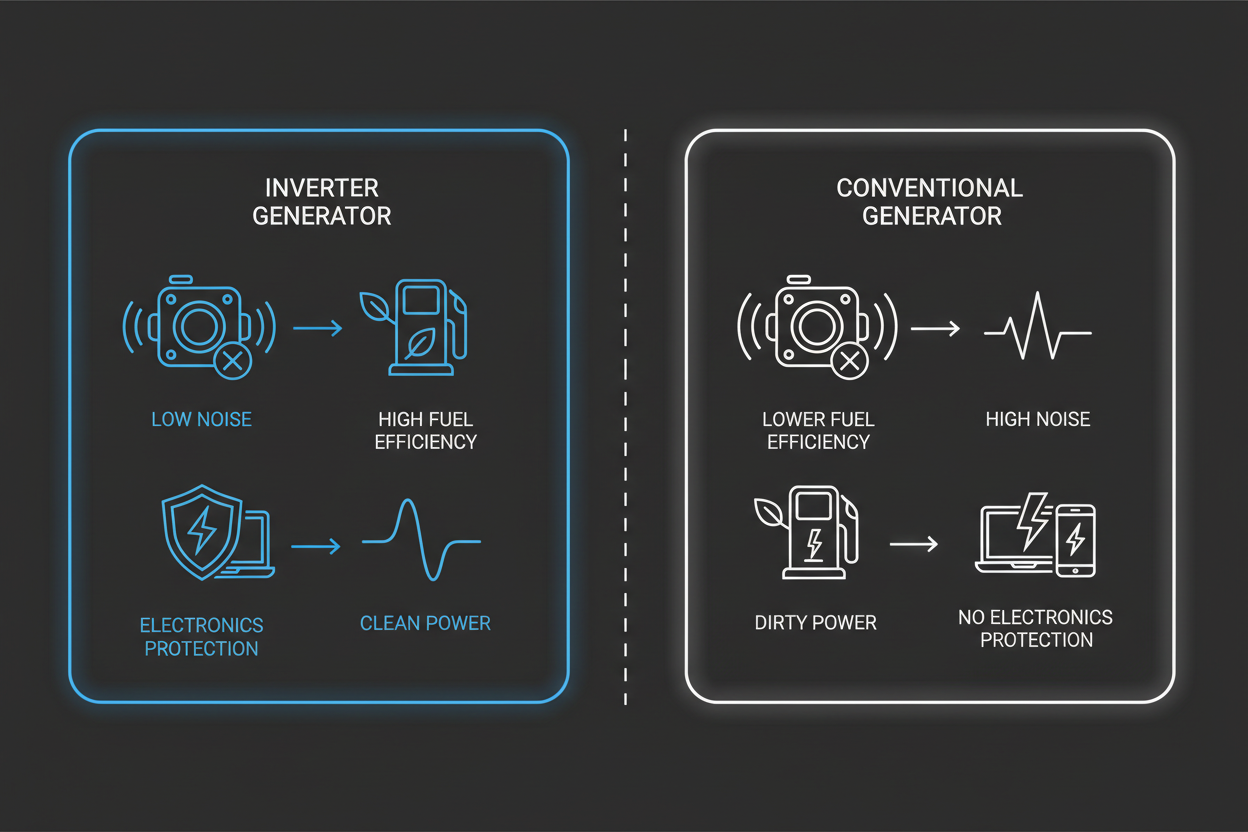Introduction
Many buyers wonder, “Are inverter generators worth it?” Although they often cost more upfront than conventional models, inverter generators offer major advantages in noise, fuel efficiency, portability, and electronics safety. When you evaluate total cost across lifespan, performance, and reliability, they deliver significantly higher value—especially for RV users, homeowners, and outdoor travelers. For a deeper technical foundation, see the main Inverter Generator Guide.
Upfront Cost vs Long-Term Savings
Inverter generators cost more initially because they use advanced electronics, enclosed housings, and higher-precision components. However, long-term advantages include:
- reduced fuel consumption over hundreds of running hours
- fewer maintenance issues from smoother operation
- safer, cleaner power for sensitive electronics
- longer engine life due to optimized RPM control
- quieter operation that expands where you can use them
- portable design that increases real-world usage
When you factor in fuel savings and reduced downtime, inverter generators often become the cheaper option over their full service life. For efficiency details, compare with Inverter Generator Efficiency Explained.

Where Inverter Generators Clearly Win
In key categories, inverter generators outperform conventional units and justify their higher sticker price:
- Noise: significantly lower sound levels in real use
- Fuel efficiency: optimized via variable RPM and ECO mode
- Electronics safety: pure sine wave, low-THD output
- Portability: compact, lighter, and easier to store
- Environmental impact: reduced emissions per kWh
These benefits matter most during frequent, daily, or extended operation.
Noise Comparison
Noise is one of the most noticeable differences between inverter and conventional generators.
- Inverter generator: 52–60 dB at typical working load
- Conventional generator: 70–90 dB at similar load
This is roughly the difference between:
- a conversation at home
- standing next to a lawnmower
For RV parks, neighborhoods, and campgrounds, published noise limits often make inverter generators the only practical choice. For more detail, see Inverter Generator Noise Reduction Technology.
Fuel Efficiency Makes a Big Difference
Inverter generators use smart RPM control to match engine speed to electrical load. When demand is low:
- engine speed slows instead of running at full RPM
- fuel burn decreases significantly per hour
- runtime increases on each tank of fuel
Over hundreds of hours, these savings can easily exceed the price difference between inverter and conventional models—especially for RV travelers and homeowners who run generators for long periods.
Electronics Safety Is a Game-Changer
Modern households rely on sensitive electronics, including:
- laptops and tablets
- modems and Wi-Fi routers
- game consoles and streaming devices
- CPAP machines and medical devices
- 4K TVs and sound systems
- cameras and power station charging
Inverter generators supply low-THD pure sine wave power that protects these devices from surges, waveform distortion, and long-term stress. Conventional generators can introduce spikes and noise that lead to overheating and premature failure. For more protection guidance, see Are Inverter Generators Safe for Electronics?.
For many users, electronics safety alone makes inverter generators worth the investment.
Portability and Ease of Use
Inverter generators are designed for everyday carrying and storage. They are typically:
- smaller than open-frame alternatives
- lighter for one-person transport
- easier to carry with molded handles or wheel kits
- simpler to store in RV compartments or garages
This portability makes them ideal for:
- RV trips and fifth-wheel travel
- camping and overlanding
- tailgating and outdoor events
- apartment emergencies and small homes
Because they are easier to move and start, owners tend to use them more often and in more scenarios.
When a Conventional Generator Might Make Sense
There are a few cases where a traditional generator is still acceptable or cost-effective:
- job sites powering corded tools and compressors
- high-load, low-sensitivity industrial equipment
- users on a very limited budget who rarely need backup power
- applications where noise and THD are not a concern
For most home backup, RV, and camping situations, however, inverter generators deliver far more overall value than conventional units.
Who Benefits Most from Inverter Generators?
Inverter technology delivers the biggest benefits to users who need quiet, stable power in real-life environments. They are especially valuable for:
- homeowners who need quiet, clean backup power
- RV travelers powering air conditioners and onboard systems
- campers and overlanders who value low noise
- people with electronics-heavy setups at home or on the road
- buyers who frequently move and store their generator
If you fit into any of these groups, an inverter generator is almost always worth the additional upfront cost. You can explore scenario-specific advice in our RV Generator Guide, Camping Generator Guide, and Home Backup Generator Guide.
Conclusion
When you analyze fuel savings, noise reduction, electronics protection, portability, and long-term value, inverter generators are unquestionably worth it for most users. Their quiet, efficient, and stable performance provides benefits that conventional generators cannot match, particularly for RV living, camping, and home backup.
To explore more benefits, comparisons, and real-world use cases, read the full Inverter Generator Guide and related cluster articles.
